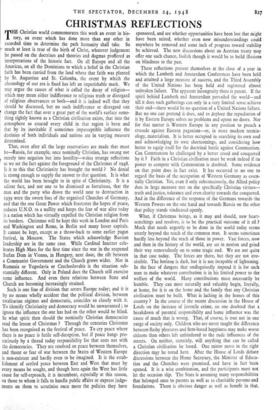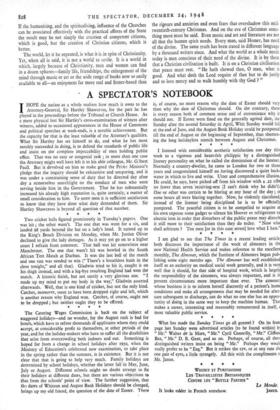CHRISTMAS REFLECTIONS
THE Christian world commemorates this week an event in his- tory, an event which has done more than any other in recorded time to determine the path humanity shall take. $o much at least is true of the birth of Christ, whatever judgement be passed on the doctrines and theories and dogmas proffered as interpretations of the historic fact. On all Europe and all the Americas, on all the Dominions to which a belief in the Christian faith has been carried from the land where that faith was planted by St. Augustine and St. Colomba, the event by which the chronology of our era is fixed has left an imperishable mark. We may argue the causes of what is called the decay of religion— which may mean either indifference to religious truth or disregard of religious observances or both—and it is indeed well that they should be discussed, but no such indifference or disregard can change the fact that over a great part of the world's surface some- thing rightly known as a Christian civilisation exists, that into the atmosphere so created every child in that region is born and that by its inevitable if sometimes imperceptible influence the destinies of both individuals and nations are in varying measure determined.
That, even after all the large reservations are made that must be—Russia, for example, once nominally Christian, has swung not merely into negation but into hostility—wakes strange reflections as we set the fact against the foreground of the Christmas of 1948. Is it to this that Christianity has brought the world ? No denial is strong enough to supply the answer to that question. It is what the world has been brought to in spite of Christianity. It is a salient fact, and not one to be dismissed as fortuitous, that the man and the party who drove the world near to destruction in 1939 were the sworn foes of the organised Churches of Germany, and that the one Great Power which frustrates the hopes of peace, reduces U.N.O. to a nullity and keeps the fear of war alive today is a nation which has virtually expelled the Christian religion from its borders. Christmas will be kept this week in London and Paris and Washington and Rome, in Berlin and many lesser capitals. It cannot be kept, except as a throw-back to some earlier pagan festival, in Moscow. The States which acknowledge Russian leadership are in the same case. While Cardinal Innitzer cele- brates High Mass for the first time since the war in the reopened Stefan Dom in Vienna, in Hungary, next door, the rift between a Communist Government and the Church grows wider. Nor in Rumania or Yugoslavia or Czechoslovakia is the situation sub- stantially different. Only in Poland does the Church still exercise some influence. And even there relations between State and Church are becoming increasingly strained.
Such is one line of division that severs Europe today; and it is by no means wholly accident that the political division, between totalitarian regimes and democratic, coincides so closely with it. To identify Christianity and democracy would be unwarranted ; to ignore the influence the one has had on the other would be blind.
In what spirit then should the nominally Christian democracies read the lesson of Christmas ? Through the centuries Christmas has been recognised as the festival of peace. To cry peace where there is no peace is futile self-deception, but if peace hangs pre- cariously by a thread today responsibility for that rests not with the democracies. They are resolved on peace between themselves, and threat or fear of war between the States of Western Europe is non-existent and hardly even to be imagined. It is the estab- lishment of settled peace between East and West that must by every means be sought, and though here again the West has little cause for self-reproach, it is incumbent, especially at this season, on those to whom it falls to handle public affairs or express judge- ments on them to scrutinise once more the policies they have sponsored, and see whether opportunities have been lost that might have been seized, whether even now misunderstandings could anywhere be removed and some inch of progress toward stability be achieved. The new discussions about an Austrian treaty may offer one such chance, foolish though it would be to build illusions on blindness to the past.
These reflections present themselves at the close of a year in which the Lambeth and Amsterdam Conferences have been held and attained a large measure of success, and the Third Assembly of the United Nations has been held and registered almost unbroken failure. The apparent incongruity there is patent. If the spirit behind Lambeth and Amsterdam pervaded the world—and till it does such gatherings can only in a very limited sense achieve their end—there would be no question of a United Nations failure. But no one can pretend it does, and to deplore the repudiation of it by Eastern Europe solves no problems and opens no doors. Nor for that matter is Western Europe in any position to preach a crusade against Eastern paganism—or, in more modern termin- ology, materialism. It is better occupied in searching its own soul and acknowledging its own shortcomings, and considering how better to equip itself for the doctrinal battle against Communism.
Can Communism be challenged by a better creed and conquered by it ? Faith in a Christian civilisation must be weak indeed if its power to compete with Communism is doubted. Some evidence on that point does in fact exist. It has occurred to no one to regard the basis of the occupation of Western Germany as essen- tially Christian. Yet, even if only subconsciously, the Allied policy does in large measure rest on the specifically Christian virtues— truth and justice, tolerance and even charity towards the conquered.
And in the difference of the response of the Germans towards the Western Powers on the one hand and towards Russia on the other that policy stands vindicated openly.
What, if Christmas brings, as it may and should, new heart- searchings and resolves, is to be the practical outcome of it all ?
Much that needs urgently to be done in the world today seems utterly beyond the reach of the common man. It seems sometimes hardly less beyond the reach of those in power. Vast forces, now and then in the history of the world, are set in motion and grind their way remorselessly on to some tragic end. We are not quite in that case today. The forces are there, but they are not irre- sistible. The horizon is dark, but it is not incapable of lightening.
In the face of dangers that undisguisedly impend it is for each man to make whatever contribution is in his limited power to the welfare of the world. Many contributions must necessarily be humble. They can most naturally and valuably begin, literally, at home, for it is on the home and the family that any Christian civilisation must be built. What is lacking in the homes of this country ? In the course of the recent discussion in the House of Lords on the increase of juvenile crime, no one doubted that a breakdown of parental responsibility and home influence was the cause of much that is wrong. That, of course, is true not in one range of society only. Children who are never taught the difference between flashy pleasures and firm-based happiness may make worse citizens than others left unhindered to the rude influences of the streets. On neither, certainly, will anything that can be called a Christian civilisation be based. One minor move in the right direction may be noted here. After the House of Lords debate discussions between the Home Secretary, the Minister of Educa- tion and the Churches were promised, and have in fact been opened. It is a wise combination, and the participants must not let the occasion slip. The State is assuming many responsibilities that belonged once to parents as well as to charitable persons-and foundations. There is obvious danger as well as benefit in that. If the humanising, and the spiritualising, influence of the Churches can be associated effectively with...the practical efforts of the State the result may be not simply the creation of competent citizens, which is good, but the creation of Christian citizens, which is better.
The world, let it be repeated, is what it is in spite of Christianity. Yet, when all is said, it is not a world to revile. It is a world in which, largely because of Christianity, men and women can find in a dozen spheres—family life, friendships, the enlargement of the mind through music or art or the wide range of books now so easily available to all—an enjoyment far more real and firmer-based than the rigours and anxieties and even fears that overshadow this mid- twentieth-century Ghristmas. And on the eve of Christmas some- thing more must be said. Even music and art and literature are not all that the human spirit needs. Every man, said Homer, has need of the divine. The same truth has been stated in different language by a thousand writers since. And what the world as a whole needs today is men conscious of their need of the divine. It is by them that a Christian civilisation is built. It is on a Christian civilisation that peace must rest. " He hath shewed thee, 0 man, what is good. And what doth the Lord require of thee but to do justly and to love mercy and to walk humbly with thy God ? "



































 Previous page
Previous page